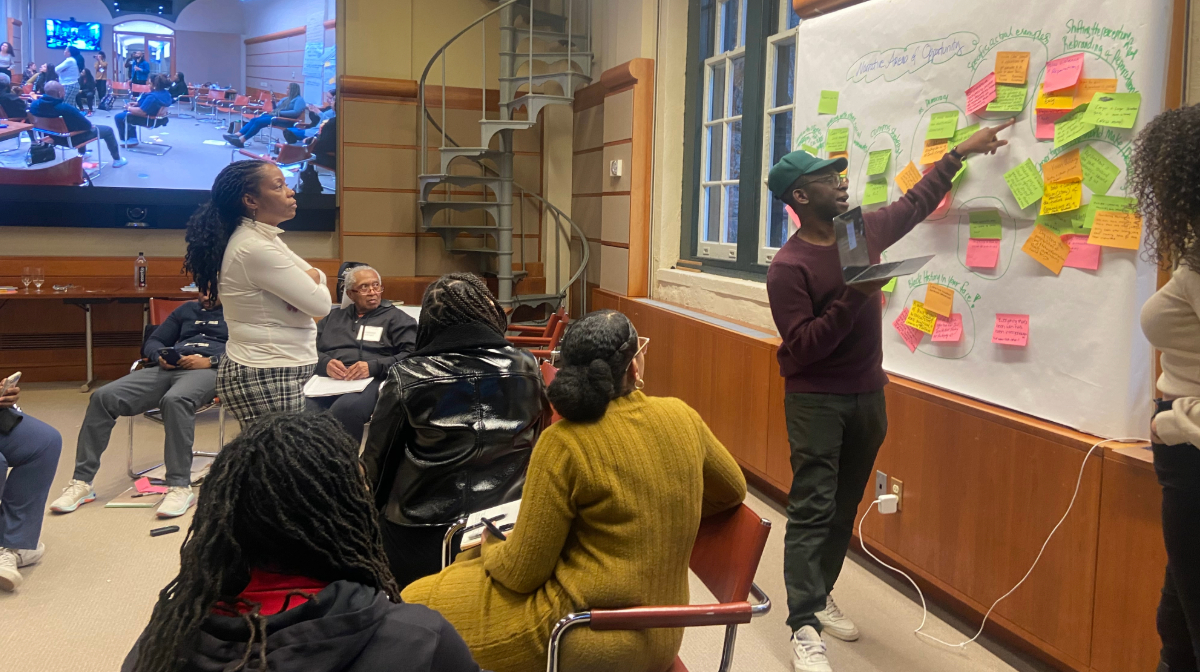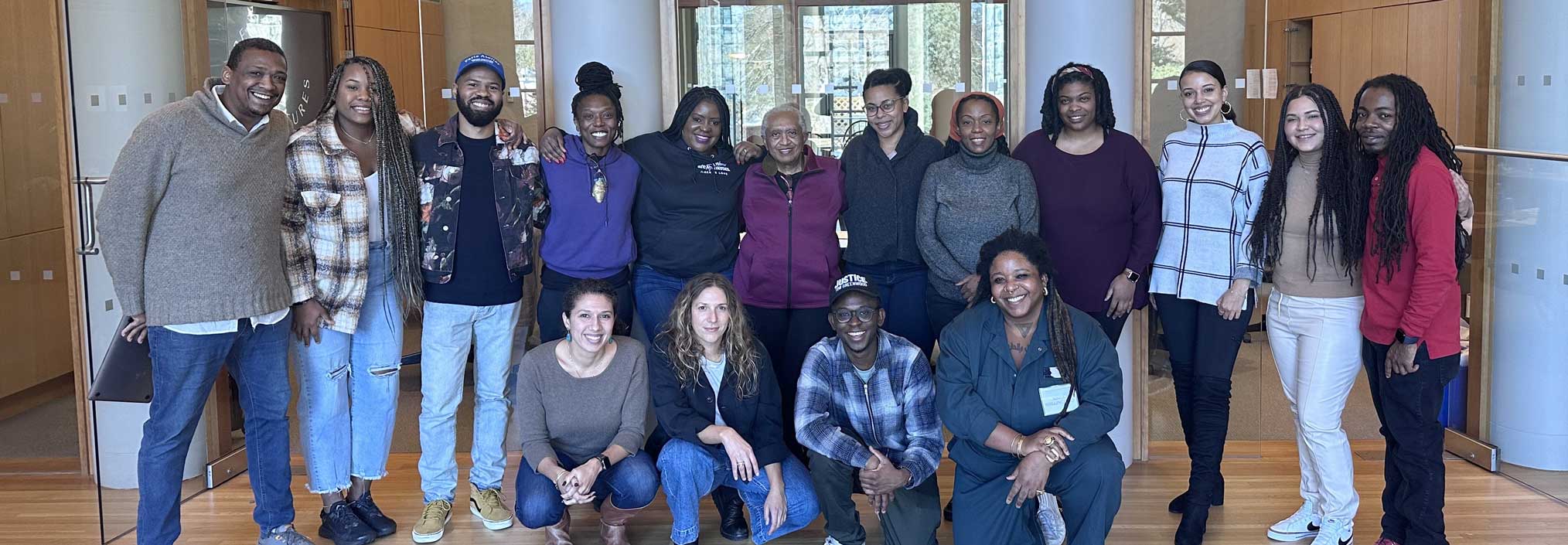Liberation Ventures is shifting the stories we tell about racism in America to advance the movement for repair.
The centuries-long effort to achieve reparations for Black Americans is gaining significant traction, galvanized in large part by the racial justice movement that emerged from the 2020 police murder of George Floyd.
Last summer California began considering a list of reparations recommendations after a two-year study of the issue; New Jersey created a reparations council; and New York lawmakers approved a bill to study the issue. Those initiatives followed a housing-centered reparations program Evanston, Illinois, established in 2021.
But the issue remains divisive, with a Pew Research Center survey recently showing that 77 percent of Black Americans, compared with only 18 percent of White Americans supporting reparations for descendants of enslaved people. Leaders in the reparations movement maintain that the efforts can succeed only if deep cultural change occurs, including a drastic revision of America’s collective narratives around Black history and experience.
That revision is the guiding mission of Liberation Ventures, established in 2020 to drive change in the predominant narratives and lay the groundwork for federal-level financial reparations–“our North Star,” as Co-founder and CEO Aria Florant called it. The nonprofit is also working on racial repair that goes beyond financial considerations.
“Reparations is really a step on the path to actually building a just, multi-racial democracy.”
“Reparations is really a step on the path to actually building a just, multi-racial democracy,” Florant said. “The project of reparations is not just a project that is about Black people. It is about all of us. It is about what building a true culture of repair actually means in society, where repair is natural, and we do repair whenever harm is caused.”
Central to Liberation Ventures’ mission is Narrative House, an innovative, interactive digital platform that the organization calls a “schema” to help orient people to reparations, “inspire stories and action” that strengthen support for the movement, and “uproot anti-Blackness.”
Narrative House formed the bedrock of the Reparations Narrative Lab, a creative and research hub for building public support for reparations by providing assistance to create and test stories and messages, analyze audiences, design experiments, and assess the impact of strategies.
The first version of the Lab convened 13 racial justice organizations in 2022-23. After hashing out questions and narratives about reparations, coordinating focus groups, and commissioning audience research, the organizations worked with content creators and influencers to create poetry, social media posts, and other creative pieces.
“It was a process of learning together—about how narrative has been used in other social movements, about narratives that many reparations organizations are using, and about audiences,” Florant said. “Then we created together and tested our creative works.”
Liberation Ventures is experimenting with measuring the larger impact of the Lab’s output and similar content. At the same time, the 13 groups and other national and local racial justice organizations continue to utilize Narrative House resources to advance reparations and social change.
In addition to its narrative work, Liberation Ventures provides grants and support to organizations and other entities working toward reparations and racial justice. Liberation Ventures’ grantmaking recently reached $6 million.
The organization also provides capacity-building support in several ways. In partnership with the Urban Institute and the Brookings Institution, Liberation Ventures established a Reparations Research Consortium that brings together reparation researchers and movement builders. And Liberation Ventures is launching an opinion poll to better understand public perspectives on reparations.
An Economic, Political, and Cultural Effort
At the heart of Liberation Ventures’ work to change narratives is the goal of debunking myths—that racism has ended, for example—and replacing them with accurate understandings about the impacts of slavery and ongoing discrimination.
“The founding of this nation is built upon some concrete myths, one of which is that Black people are inferior to White people and through that they should be enslaved,” said Trevor Smith, Liberation Ventures' former Director of Narrative Change who recently left the organization to build another group focused on the interconnectedness between Black and Indigenous people. “That original lie cemented anti-Blackness as part of the culture of the United States. We think of reparations as an economic project but also a political and cultural project.”
“We think of reparations as an economic project but also a political and cultural project.”
Narrative power is the ability to tell stories that shift cultural mindsets, Smith said.
Journalists, writers, artists, content creators, and educators play key roles in that work while the movement ripples out to people from all walks of life.

At Liberation Ventures gatherings in February 2023, participants worked on finding opportunities to change collective, inaccurate narratives about Black history and experience. Credit: Liberation Ventures
“We want to see more stories about Black liberated futures and the interconnected nature of the reparations movement with other movements,” Smith said. As examples he noted the Oscar-winning 2018 film “Black Panther” and support the Black reparations movement has received from the Japanese-American redress movement.
Liberation Ventures also looks to widen the reach of the new narratives in traditional and nontraditional media, including music, comedy, and public spaces.
“We want to immerse these narratives within pop culture.”
“We want to immerse these narratives within pop culture, within broader society,” Smith said.
Kamille Gardner, Global Project Director for Canopy Collective, a racial justice organization, participated in the Narrative Lab. She called it “incredible,” and was particularly impressed by its collaborative structure.
“It was very open for us to come in and leave a footprint,” she said.
Lab participant Amity Paye, Chief Communications Officer for the national organization Color Of Change (also a MacArthur grantee), called the Narrative House “quite a revolutionary tool” that Color Of Change also is using for its criminal justice work and “Black Tech” campaign that seeks to eliminate discrimination in peoples’ digital lives.
‘Amazing Window of Opportunity’
Federal lawmakers have been considering reparations since 1989, when U.S. Rep John Conyers Jr., a civil rights advocate, introduced a bill to study the impact of slavery and its lasting consequences then recommend “appropriate remedies.” Conyers introduced House Bill 40 at the start of each Congressional session until he left Congress in 2017.
While that effort continues, Paye said reparations work has been most effective at the local level and in education.
“That gives us a lot of hope,” she said. “You have to start with those smaller local wins in order to build a case that reparations can be successful.”
Liberation Ventures’ analysis of polling on reparations over the past 25 years found increasing support. Today, 31 percent of Americans surveyed support cash payment reparations for slavery, compared to about 15 percent in 2000.
Florant and other advocates say to achieve full racial justice, reparations must expand beyond those cash payments and include, among other elements, reckoning—a comprehensive examination of actions that contributed to racial harm—and acknowledgement—a recognition of systemic racism in U.S. history. As examples, Florant said reckoning can occur through school curriculum; acknowledgment can include monuments and memorials such as those Germany created about the Holocaust.
Other components of reparations are accountability for systems to be racially just and redress, generally defined as a process by which reparation can be achieved.
The more expanded view of reparations underscores the need for the new, powerful narrative at the heart of Liberation Ventures’ efforts. Creating that change and empowering racial justice organizations “is both the destination and the journey,” Florant said.
“We have a really amazing window of opportunity right now,” she said. “Everybody has to get involved.”
In 2022, MacArthur provided Liberation Ventures, a project of PolicyLink, with $400,000 in flexible support to continue building its strategy of growing a national network to repair the trauma of slavery and its legacy by closing the racial wealth gap and disrupting White supremacist narratives.




